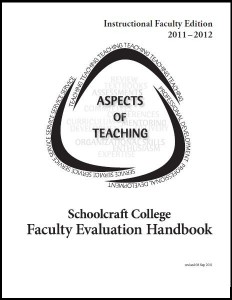Faculty Members as Widgets
 According to the Faculty Evaluation Handbook, “The best way to prepare [your teaching unit] is to imagine that you will be out on sick leave and a colleague will be taking your place in the classroom. In your absence you want the colleague to run the course exactly as you would.”
According to the Faculty Evaluation Handbook, “The best way to prepare [your teaching unit] is to imagine that you will be out on sick leave and a colleague will be taking your place in the classroom. In your absence you want the colleague to run the course exactly as you would.”
Theoretically it might be possible for me to design a teaching unit that has such low standards and is so devoid of my expertise that a colleague could teach it exactly as I would. But any attempt to produce something of such low quality would only end in failure because the individual faculty member is not a widget that can be simply replaced by another widget. If I want my students to have quality, I should give my colleague only a general framework for what I hope to accomplish and then let him or her build the presentation around his or her personality, expertise, and teaching style.
For my evaluation packet, I am going to use a lesson I taught on “Propaganda Films During WW II.” Unlike with most of my presentations, I do have a PowerPoint prepared for the unit. The presentation also has extensive notes to accompany the slides that would make it possible for someone to give the lecture for me. But the fact that anyone could give the presentation for me does not mean that they could give it like I would—much less exactly as I would.
As part of this lecture, I give some background on the educational nature of film during which I show the trailers for Bringing Up Baby, I’m No Angel, and Sex Madness. These are good examples of A movies, B movies, and exploitations films, but they are not the only good examples. Especially because they are consistent with the types of films I tend to cite, I would prefer a colleague who is giving this lecture for me to pick his/her own films so that students end up with a wider exposure than they could get just from me. To not allow my colleague’s expertise to enter the classroom would be such a waste.
Instead of asking me to prepare my teaching unit assuming that “a colleague will be taking your place in the classroom,” I would actually prefer to work under the assumption that it would be a student who was teaching “Propaganda Films During WWII.” Unlike a colleague, the student knows what we had previously covered and would have a better idea as to how the lesson fits into the class.
For example, if earlier this semester a student gave this presentation based on my notes, she or he would have known that I had already shown the Sex Madness clip. Instead of screening a portion of that film, the student would be able to substitute a clip from another exploitation film mentioned but not seen in class; such as something from Marijuana, Reefer Madness, or Maniac. Given the likely pool of colleagues who could cover this lesson for me, a student in the class would be in a better position to make this decision than would a colleague. The student would also likely be able to better facilitate a class discussion consistent with the class dynamics.
I understand that the individuals who wrote the Faculty Evaluation Handbook want clear enough directions so that a peer evaluator can understand the content and purpose of what is submitted. But the expectation that anyone could teach my material exactly like I would shows a poor understanding of effective pedagogy because it essentially assumes that individual instructors are irrelevant.
[…] Therefore, when I raise issues about things that do not count as service; as I did in “Faculty Members as Widgets,” I am writing from a position of strength. Although I believe it would be better to modify our […]